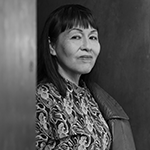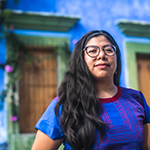This is a Forced Trip
a forced landing that forces me to spend six hours in Kiev
when the plane approaches the runway
and it seems we’re entering a storage site that leads to other sites
more sophisticated more lonely more sad
Too much has been written already about people forced to stay in one place
forced to leave without explanation forced to flee
a forced geography
genetically modified foods
forced to abandon their essence
I am from K a forced country
She speaks in statistics
and can’t stop staring at an Orthodox Jewish family
dragging several kids and a bunch of suitcases
The number of dead has now surpassed the number of those who struggle
for the liberation of any forced country of the world
Which side are you from?
from the ones who travel out of necessity or curiosity?
who remove cartridges projectiles mines?
leave messages decode decompose?
stockpile gunpowder?
From the ones who burn or are burned?
From the military-technical cooperation?
From the United Nations or NATO?
From the photograph of a country that isn’t a country?
From the postcard?
From the botany of not taking sides with anyone?
From the seeds of flowers that have no territory?
From laboratories?
From experiments?
From cellular chemistry?
From the contaminated nation?
From all the girls with eyebrows mapped out like solar systems
that live inside of me
To be or not to be is not a dilemma but rather to align with an army on one side
or the other–of the river Jordan
I like knowing there’s someone else walking inside of me
like an anchor-dog inside my footprints
a built-in spirit who steps and coughs along with me
who falls down and gets back up
who corrects me feeds me
and sees me in the forced future
[its parade of dust]
my prehistoric side
I used to stand at the door of my house waiting for the moment of detachment
eye contact with that other part
a forced root listening to itself grow
doesn’t listen to the house invaded by other forced roots
to be sympathetic
They came to Lima to study
they brought their neon colors and music in order to multiply and grow
they picked a piece of land or invented it or invaded it
and perhaps afterwards they also invented the river surrounded by stones
without water maybe even the house
Poetry sold whatever was expelled by the air
it nourished the scraps that denied its own existence
filled silences with the strategies of an architect who empties cities
poetry wanted beauty they wanted cleanliness
it trundled a wheelbarrow that filled up with ideals and mirrors
forced to dispense with the basics: oxygen and water
I saw myself transporting those who were wounded by its words
I healed their lesions brought them back to the world of broken wings
brought them back to the demands of the market
I used to ask my father and not my mother she was worse off
to sharpen the knives
Poetry walked all day long pushing her discordant machine
trailed by her grandson who was learning the trade and served as her eyes
her Andean eyes had such small hands
but everything: oxygen and water fit into her depths
he was the future but I called him her eyes
the eyes of poetry that looked at the present
The woman says
we refer to god with the words of god
in other words there’s a language for pleasure
a special vocabulary for defining nuclear waste
there’s electricity if you can pay for it pleasure
but the census doesn’t talk about that
god and pleasure
like first love like the first time
they become a drowned chorus
She’ll improvise a vocabulary for pleasure
from her hands I’ll take the air the butterflies
I’ll save my breath
to explain to the soldier that his statistics
are useless
there’s no way to justify massacres
femicides corruption homophobia
endangered species that with any luck
will be turned into sheets of stickers
A plan to industrialize Chernobyl should include
maximum security for investors
discretion
and a country forced to endure it
The woman says I am a forced country
showing off her muscle yes I can
she is neither tall nor blonde
doesn’t wear a turban and she won’t say it in English
there’s a distance
though she is right in front of me that’s all
there’s a distance that reminds me
of what we forget when living in a forced country
Before god there were few words
She says there was god before
Este es un viaje forzado
un aterrizaje forzado que me obliga a pasar seis horas en Kiev
cuando el avión se acerca a la pista de aterrizaje
y parece que entramos a un almacén que conduce a otros almacenes
más sofisticados más solitarios más tristes
Se ha escrito demasiado sobre gente forzada a quedarse en un lugar
forzada a partir sin explicación forzada a dejar
geografía forzada
alimentos genéticamente manipulados
forzados a abandonar su ser
Soy de K un país forzado
Ella habla en estadísticas
no le quita la mirada a una familia judío-ortodoxa
que arrastra varios niños y muchas maletas
El número de muertos es tal que sobrepasa a los que lucharán
por la independencia de cualquier país forzado del mundo
¿De qué lado estás?
¿del que viaja por curiosidad o por necesidad?
¿remueve cartuchos proyectiles minas?
¿deja mensajes descifra descompone?
¿acumula pólvora?
¿De los que queman o son quemados?
¿De la cooperación técnico-militar?
¿De la United Nations o de la OTAN?
¿De la fotografía del país que no es el país?
¿De la postal?
¿De la botánica de no tomar partido por nadie?
¿De las semillas de las flores que no conocen de territorios?
¿De los laboratorios?
¿De los experimentos?
¿De la química celular?
¿De la nación impura?
De todas las muchachitas con las cejas demarcadas como sistemas solares
que habitarán en mí
Ser o no ser no es un dilema sino alinearse en un ejército de un lado
o del otro del río Jordán
Me gusta saber que hay alguien más que camina en mí
como un perro ancla en mis huellas
un ánima pegadita que pisa y tose después de mí
que se cae y se levanta
que me corrige que me alimenta
que me ve en el futuro forzado
[su desfile de polvo]
mi lado fósil
yo me paraba en la puerta de mi casa a esperar ese desprendimiento
el contacto visual con mi otra parte
una raíz forzada escuchándose crecer
no escucha la casa invadida por otras raíces forzadas
a ser simpáticas
Llegaron a Lima para estudiar
trajeron los colores fosforescentes y la música para multiplicarse y crecer
eligieron un campo o lo inventaron o lo invadieron
y quizás entonces también inventaron el río rodeado de piedras
sin agua y la casa
La poesía vendía lo que expulsaba el aire
alimentaba la chatarra que le negaba un lugar
llenaba los silencios con la estrategia del arquitecto que vaciará ciudades
quería belleza querían limpieza
empujaba una carretilla que llenó de ideales y espejitos
forzada a prescindir de lo fundamental: oxígeno y agua
me imaginaba trasladando a los heridos de esas palabras
les curaba los hoyos y los devolvía al mundo de las alas rotas
los devolvía a la necesidad del mercado
Le pedía a mi padre y no a mi madre a ella le tocó la peor parte
que afilara los cuchillos
La poesía caminaba todo el día empujando su máquina desafinadora
seguida de su nieto que aprendía el oficio y era sus ojos
sus ojos aindiados tenían unas manos pequeñas
pero todo: oxígeno y agua cabían en su profundidad
era el futuro pero yo le llamaba sus ojos
eran los ojos de la poesía que miraban el presente
La mujer dice
a dios te refieres con las palabras de dios
en otras palabras hay un idioma para el placer
hay un vocabulario especial para definir residuos nucleares
hay electricidad para el que paga hay placer
pero de eso no habla la encuesta
dios y placer
como el primer amor como la primera vez
se transforman en un coro ahogado
Ella improvisará un vocabulario para el placer
de sus manos tomaré el aire las mariposas
dejaré lo preciso
para explicarle al soldado que sus estadísticas
no sirven
no hay forma de justificar masacres
feminicidios corrupción homofobia
especies en extinción que con suerte
convertirán en láminas stickers
Un plan para industrializar Chernóbil debería incluir
máxima seguridad para los inversionistas
discreción
y un país forzado a soportarlo
La mujer dice soy un país forzado
mostrando el músculo yes I can
no es alta ni rubia
no usa turbante ni lo dirá en inglés
hay una distancia
aunque está frente a mí that´s all
hay una distancia que me recuerda
lo que se olvida viviendo en un país forzado
Antes de dios había pocas palabras
Ella dice antes estaba dios
Translators’ Note:
Roxana Crisólogo’s latest book Kauneus: la belleza (Beauty) is a distinguished collection of provocative and formally innovative poems that give voice to the alienation and ironies of exile and migration—within a leftist framework that is embedded within the global struggle against structural racism and inequality. Set in Peru, Finland, and other regions from Mozambique to Palestine to Turkey, the poems offer a transnational, intergenerational feminist poetic, irrigated from the vein of 20th century defeats.
The challenging yet beautiful sequences in Kauneus delve into her family’s experience of internal displacement, replicated across Peru which has seen waves of migrants leaving rural communities in search of opportunities in Lima. Crisólogo brings this diasporic sensibility as she writes about other “forced countries” and the refugees who flee poverty, violence, and climate catastrophe.
One of the challenges of translating these poems that others have deemed as “untranslatable” is the swift thematic upheavals, the ever-shifting subjectivities, and the rhetorical leaps that mark her style. While not inaccessible at the level of grammar, the poems are multivalent and invite a synaptic, intuitive reading. Having studied law, Crisólogo deploys then subverts an ironic form of ‘legalese,’ drawing attention to the thick cushion of illogic that undergirds the dichotomies between the global north and the global south. Ultimately the seemingly unrelated strands coalesce into a mosaic that is both figurative and abstract.
Judith and I have spent a great deal of time and care in rendering the complexities and the lyrical dexterity of these sometimes-bewildering texts, especially this one and its complex middle section, which Crisólogo would describe as muy, pero muy aindiado: I mean really Andean/Indian/Indigenous.

Roxana Crisólogo is a poet, translator, and cultural director who studied law. Her books of poetry include Abajo sobre el cielo (Lima, 1999) whose Finnish translation was published by Kääntöpiiri, Helsinki, 2001; Animal del camino (Lima, 2001); Ludy D (Lima, 2006); Trenes (Mexico, 2010, republished by Ediciones Libros del Cardo, Chile in 2019); and Eisbrecher (Icebreaker) Hochroth Verlag (Berlin, 2017). An anthology of her poetry has been translated into Italian, Sotto sopra il cielo (Down above the Sky) was published by Seri Editore. Kauneus: la belleza (Intermezzo Tropical, Lima, 2021) is her latest book of poetry, republished by Ediciones Nebliplateada, Buenos Aires, 2023. Crisólogo is the founder of Sivuvalo Platform, a multilingual literature association based in Helsinki. She was president of the association of Finnish left-wing artists and writers, Kiila. She was recently awarded a grant from the Finnish Kone Foundation to work on the Sivuvalo project. Crisólogo literary work and projects have been supported by the Finnish foundations, Kone Foundation, Finnish Literature Exchange, Arts Promotion Centre Finland, Kari Mattila Säätiö and the Finnish Cultural Foundation. She lives and works in Helsinki. (Photo: Dirk Skiba)

Kim Jensen is a Baltimore-based writer, poet, educator, and translator who has lived in California, France, and Palestine. Her books include an experimental novel, The Woman I Left Behind, and two collections of poems, Bread Alone and The Only Thing that Matters. Active in transnational peace and social justice movements for decades, Kim’s writings have been featured in Transition, International Human Rights Arts Festival, Another Chicago Magazine, Electronic Intifada, Mondoweiss, Extraordinary Rendition: Writers Speak Out on Palestine, Gaza Unsilenced, Bomb Magazine, Sukoon, Mizna, Revista el Humo, Left Curve, Liberation Literature, and many others. In 2001, she won the Raymond Carver Award for short fiction. Kim is currently professor of English and Creative Writing at the Community College of Baltimore County, where she co-founded an interdisciplinary literacy initiative that demonstrates the vital connection between classroom learning and social justice in the broader community.

Judith Santopietro is a Mexican writer who was awarded the writing residency at the International Writing Program at the University of Iowa in 2022. She was a finalist for the 2020 Sarah Maguire Prize for Poetry in Translation for her book Tiawanaku. Poems from the Mother Coqa, translated by Ilana Dann Luna. She has published in the Anuario de Poesía Mexicana 2006 (Fondo de Cultura Económica), Rio Grande Review, and The Brooklyn Rail, andhas also participated in the PEN America’s World Voices Festival in New York in 2018. Santopietrohas carried out research residencies in the Sierra de Zongolica and Tecomate, Veracruz; theTeresa Lozano Long Institute of Latin American Studies, Texas; and the University of Leiden, The Netherlands; as well as in New York and Bolivia. She is writing a novel on indigenous migrationin the US, and a documentary poetry book on enforced disappearance in Mexico.

 BACK TO ISSUE
BACK TO ISSUE